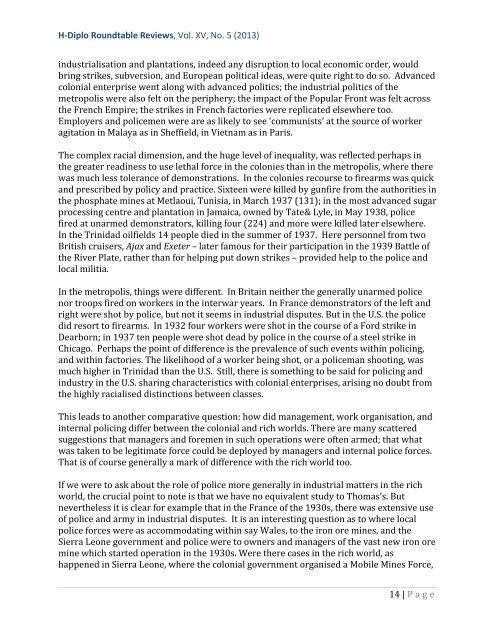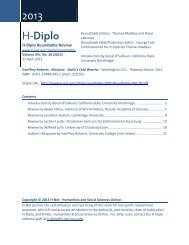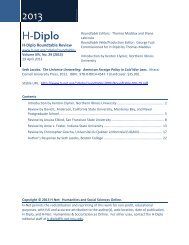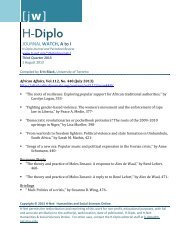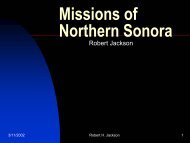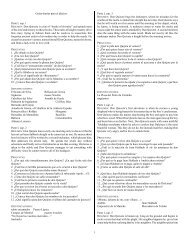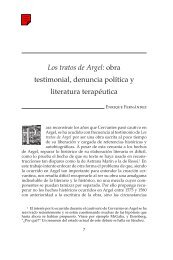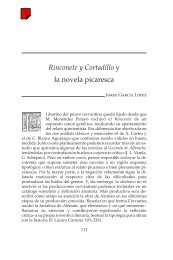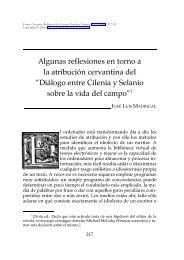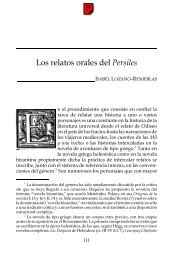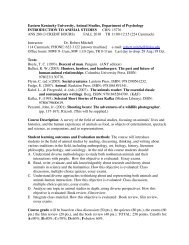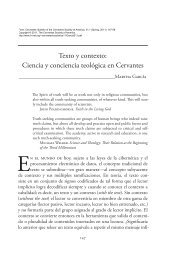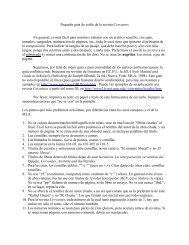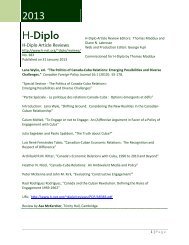H-Diplo Roundtable on Martin Thomas. Violence and ... - H-Net
H-Diplo Roundtable on Martin Thomas. Violence and ... - H-Net
H-Diplo Roundtable on Martin Thomas. Violence and ... - H-Net
You also want an ePaper? Increase the reach of your titles
YUMPU automatically turns print PDFs into web optimized ePapers that Google loves.
H-<str<strong>on</strong>g>Diplo</str<strong>on</strong>g> <str<strong>on</strong>g>Roundtable</str<strong>on</strong>g> Reviews, Vol. XV, No. 5 (2013)<br />
industrialisati<strong>on</strong> <strong>and</strong> plantati<strong>on</strong>s, indeed any disrupti<strong>on</strong> to local ec<strong>on</strong>omic order, would<br />
bring strikes, subversi<strong>on</strong>, <strong>and</strong> European political ideas, were quite right to do so. Advanced<br />
col<strong>on</strong>ial enterprise went al<strong>on</strong>g with advanced politics; the industrial politics of the<br />
metropolis were also felt <strong>on</strong> the periphery; the impact of the Popular Fr<strong>on</strong>t was felt across<br />
the French Empire; the strikes in French factories were replicated elsewhere too.<br />
Employers <strong>and</strong> policemen were are as likely to see ‘communists’ at the source of worker<br />
agitati<strong>on</strong> in Malaya as in Sheffield, in Vietnam as in Paris.<br />
The complex racial dimensi<strong>on</strong>, <strong>and</strong> the huge level of inequality, was reflected perhaps in<br />
the greater readiness to use lethal force in the col<strong>on</strong>ies than in the metropolis, where there<br />
was much less tolerance of dem<strong>on</strong>strati<strong>on</strong>s. In the col<strong>on</strong>ies recourse to firearms was quick<br />
<strong>and</strong> prescribed by policy <strong>and</strong> practice. Sixteen were killed by gunfire from the authorities in<br />
the phosphate mines at Metlaoui, Tunisia, in March 1937 (131); in the most advanced sugar<br />
processing centre <strong>and</strong> plantati<strong>on</strong> in Jamaica, owned by Tate& Lyle, in May 1938, police<br />
fired at unarmed dem<strong>on</strong>strators, killing four (224) <strong>and</strong> more were killed later elsewhere.<br />
In the Trinidad oilfields 14 people died in the summer of 1937. Here pers<strong>on</strong>nel from two<br />
British cruisers, Ajax <strong>and</strong> Exeter – later famous for their participati<strong>on</strong> in the 1939 Battle of<br />
the River Plate, rather than for helping put down strikes – provided help to the police <strong>and</strong><br />
local militia.<br />
In the metropolis, things were different. In Britain neither the generally unarmed police<br />
nor troops fired <strong>on</strong> workers in the interwar years. In France dem<strong>on</strong>strators of the left <strong>and</strong><br />
right were shot by police, but not it seems in industrial disputes. But in the U.S. the police<br />
did resort to firearms. In 1932 four workers were shot in the course of a Ford strike in<br />
Dearborn; in 1937 ten people were shot dead by police in the course of a steel strike in<br />
Chicago. Perhaps the point of difference is the prevalence of such events within policing,<br />
<strong>and</strong> within factories. The likelihood of a worker being shot, or a policeman shooting, was<br />
much higher in Trinidad than the U.S. Still, there is something to be said for policing <strong>and</strong><br />
industry in the U.S. sharing characteristics with col<strong>on</strong>ial enterprises, arising no doubt from<br />
the highly racialised distincti<strong>on</strong>s between classes.<br />
This leads to another comparative questi<strong>on</strong>: how did management, work organisati<strong>on</strong>, <strong>and</strong><br />
internal policing differ between the col<strong>on</strong>ial <strong>and</strong> rich worlds. There are many scattered<br />
suggesti<strong>on</strong>s that managers <strong>and</strong> foremen in such operati<strong>on</strong>s were often armed; that what<br />
was taken to be legitimate force could be deployed by managers <strong>and</strong> internal police forces.<br />
That is of course generally a mark of difference with the rich world too.<br />
If we were to ask about the role of police more generally in industrial matters in the rich<br />
world, the crucial point to note is that we have no equivalent study to <strong>Thomas</strong>’s. But<br />
nevertheless it is clear for example that in the France of the 1930s, there was extensive use<br />
of police <strong>and</strong> army in industrial disputes. It is an interesting questi<strong>on</strong> as to where local<br />
police forces were as accommodating within say Wales, to the ir<strong>on</strong> ore mines, <strong>and</strong> the<br />
Sierra Le<strong>on</strong>e government <strong>and</strong> police were to owners <strong>and</strong> managers of the vast new ir<strong>on</strong> ore<br />
mine which started operati<strong>on</strong> in the 1930s. Were there cases in the rich world, as<br />
happened in Sierra Le<strong>on</strong>e, where the col<strong>on</strong>ial government organised a Mobile Mines Force,<br />
14 | P age


